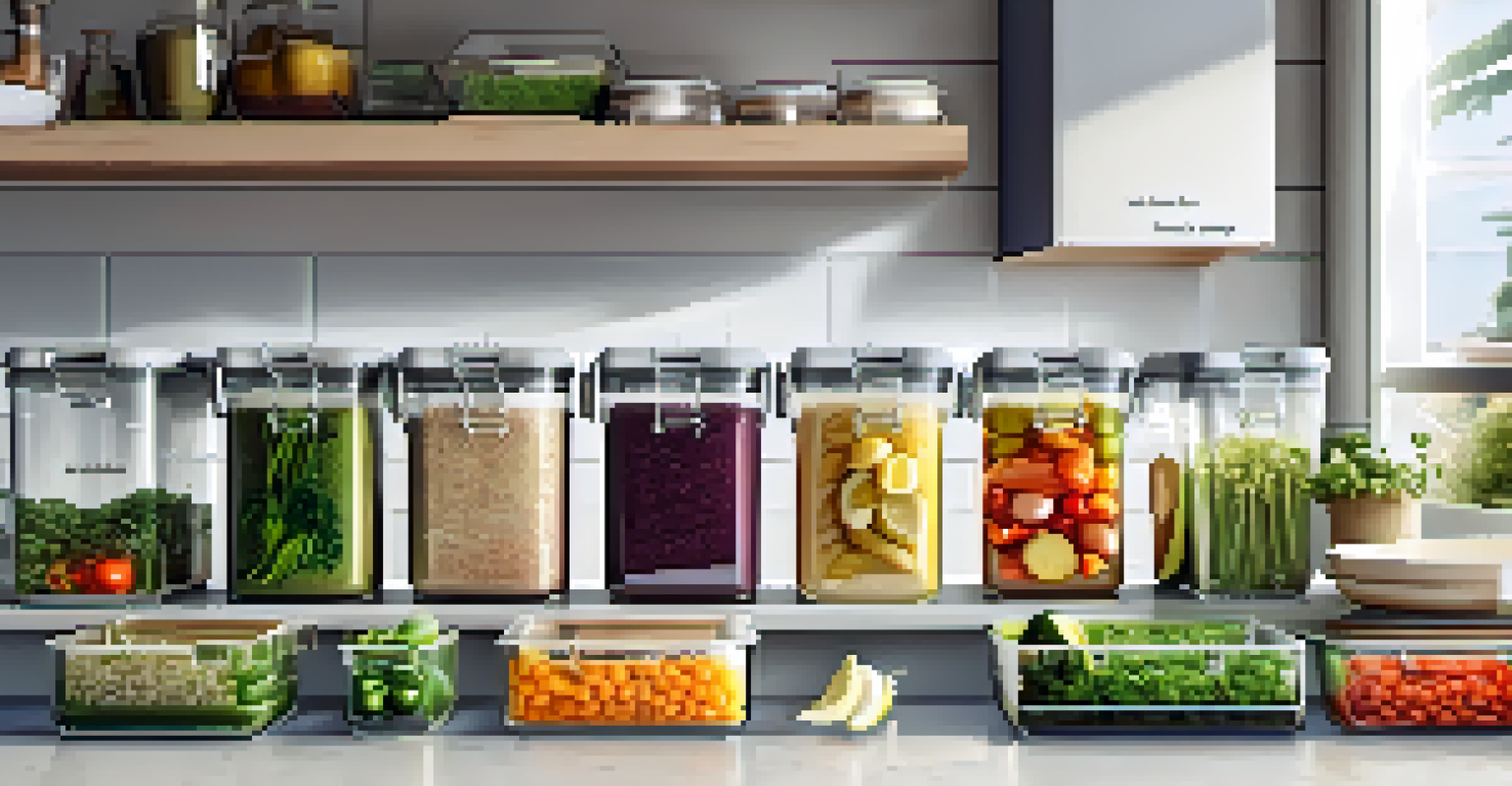How to Maintain a Balanced Diet During Busy Lifestyles

Understand the Importance of a Balanced Diet
A balanced diet is crucial for overall health, especially when life gets hectic. It provides the essential nutrients your body needs to function at its best. Think of it as fuel for a car; without the right kind, you're not going to get very far.
Let food be thy medicine and medicine be thy food.
When you're busy, it's easy to overlook your dietary needs, but neglecting them can lead to fatigue, decreased productivity, and even illness. Consistently eating a variety of foods helps to support your immune system and maintain your energy levels.
Remember, a balanced diet includes fruits, vegetables, whole grains, lean proteins, and healthy fats. By prioritizing these food groups, you're setting yourself up for success, both in your personal and professional life.
Plan Your Meals Ahead of Time
Meal planning might sound daunting, but it can save you a ton of time and stress during busy weeks. By dedicating just a little time each week to plan your meals, you can make healthier choices more convenient. Think of it as laying the groundwork for your week ahead.

Start by choosing a day to plan, like Sunday. Make a list of meals you want to prepare and create a shopping list to ensure you have everything you need. This simple step can help you avoid the last-minute temptation of unhealthy takeout.
Embrace Meal Planning
Planning your meals in advance can save time and promote healthier eating choices during busy weeks.
Additionally, consider batch cooking meals that can easily be reheated. Dishes like soups, stews, and casseroles not only save time but can also be packed with nutritious ingredients, ensuring you stay on track even when life gets chaotic.
Keep Healthy Snacks on Hand
When you're busy, it's often the snacks that derail your healthy eating efforts. Instead of reaching for chips or candy, stock up on healthy options that are easy to grab. Think of snacks as mini-meals that can help bridge the gap between your main meals.
You are what you eat, so don't be fast, cheap, easy, or fake.
Nuts, yogurt, fresh fruit, and whole-grain crackers are all excellent choices that provide nutrients and energy without the crash. Having these on hand can help you resist the urge to indulge in unhealthy snacks when you're feeling rushed or stressed.
You can also prepare snack packs in advance, like cut-up veggies with hummus or trail mix portions. This not only saves time but also makes it easier to make healthier choices when hunger strikes.
Stay Hydrated Throughout the Day
Staying hydrated is often overlooked but is a vital part of maintaining a balanced diet. Water plays an essential role in digestion, nutrient absorption, and even regulating appetite. When you're busy, it's easy to forget to drink enough water, leading to fatigue and decreased focus.
To make hydration easier, carry a reusable water bottle with you wherever you go. Set reminders on your phone or use apps that track your water intake. By making hydration a priority, you’ll boost your energy levels and help your body function better.
Keep Healthy Snacks Handy
Stocking up on nutritious snacks helps prevent unhealthy eating habits when you're on the go.
You can also incorporate hydrating foods into your diet, such as cucumbers, oranges, and watermelon. These foods not only add variety but also contribute to your overall hydration needs.
Practice Mindful Eating
In a busy lifestyle, it's easy to eat on the go or while multitasking, but this can lead to overeating. Mindful eating involves being fully present during meals, helping you recognize your hunger cues and enjoy your food. It’s like hitting the pause button in a hectic day.
Take a moment to sit down, savor each bite, and appreciate the flavors and textures of your meal. This practice can help you feel more satisfied and connected to what you're eating, reducing the likelihood of unhealthy snacking later.
Additionally, try to minimize distractions during meals, such as screens or work. Creating a designated time and space for eating can enhance your overall dining experience and promote healthier choices.
Utilize Smart Grocery Shopping Strategies
Grocery shopping can feel overwhelming, especially when you're short on time. However, with a few smart strategies, you can make the process more efficient and effective. Start by making a shopping list based on your meal plan to avoid wandering aimlessly in the store.
Stick to the perimeter of the grocery store where fresh produce, dairy, and proteins are typically located. This is where you'll find healthier options, while the inner aisles often contain more processed foods.
Stay Hydrated Daily
Prioritizing hydration is essential for maintaining energy levels and overall health.
Consider shopping online or using grocery delivery services if time is really tight. This can save you time and reduce the temptation to impulse buy unhealthy snacks.
Be Flexible and Adapt as Needed
Life is unpredictable, and sometimes even the best-laid plans can go awry. It's important to remain flexible and adaptable when maintaining a balanced diet. If you find yourself unable to stick to your meal plan, don’t be too hard on yourself; it’s all part of the journey.
Instead of viewing it as a failure, look for alternatives that fit your current situation. For instance, if you can't cook a planned meal, consider healthy options from a nearby restaurant or quick recipes that require minimal preparation.

Flexibility also means being open to trying new foods and recipes. This can make your meals more exciting and help you discover new favorites that fit your busy lifestyle.